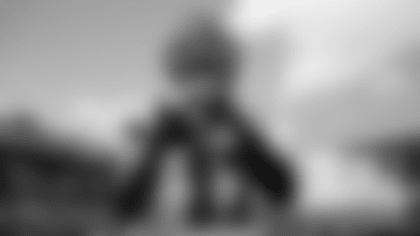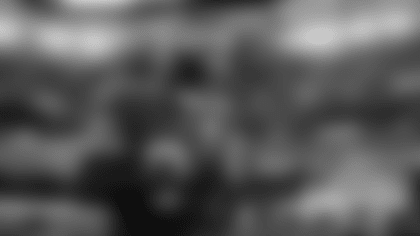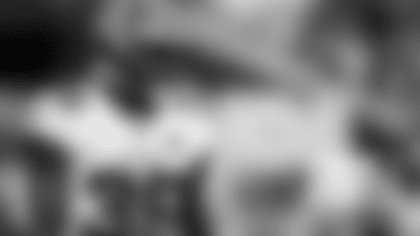One of the first things Bill Sheridan did after accepting the job of defensive coordinator with the Tampa Bay Buccaneers and arriving at team headquarters was to request a cut-up tape from the video department, using 2011 season footage.
He could have asked for a highlight reel of Adrian Clayborn sacking the quarterback, Aqib Talib returning a pick-six and Gerald McCoy collapsing the pocket…a sort of video pep-talk for the task ahead. But Sheridan wasn't looking for a boost; he was looking for the problem, and he didn't want to waste any time.
"Our staff is all about correcting and teaching," said the former New York Giants coordinator during his introductory press conference a few days later. "We are not interested in justifying or explaining, we are about finding what the issues are and correcting them and getting them taught to the extent we need to, to win."
The problem, of course, was the downturn of the Buccaneers' defense from a relatively strong showing in 2010 – ninth in the league in points allowed, at 318 – to a much less successful campaign in 2011. Tampa Bay's defense was very young last fall, but that was true in 2010 as well, and in fact much of the cast remained the same as the year before. This time, however, the Bucs allowed 494 points, 32nd in the NFL.
Points allowed, of course, is the bottom-line statistic for any defense, the direct determinant along with points scored, of wins and losses. The next level of analysis is what contributes to a team's success or failure in preventing points scored, and it didn't take long for Sheridan to identify one of the biggest factors for the Buccaneers in 2011.
In helping to assemble the rest of the staff, preparing for the NFL Scouting Combine and prepping for free agency, Sheridan has had a full plate since arriving at One Buccaneer Place. He hasn't yet had the opportunity to break down the 2011 game tape as thoroughly as he will, eventually, but that made-to-order cut-up certainly made one thing clear.
"One of a few things that really stood out was the volume of big plays they gave up here a year ago," said Sheridan. "One really encouraging thing we have seen when we watched the film was all of it is correctable. And that is the one thing that can and will be corrected, the sheer volume of big plays – which is plays that you might call plays of 20 yards or more – and a lot of that has to do with great effort and pursuit to the ball. [Head Coach] Greg [Schiano] and I saw that exactly the same from an importance standpoint."
There is no denying that the Buccaneers' defense gave up more big plays in 2011 than the year before, both in the run and in the pass. On the ground, Tampa Bay allowed 79 runs of 10 or more yards, which was the most in the NFL, and 28 of 20 or more yards. In 2010, the Bucs allowed 70 runs of 10 or more yards, but only 14 of 20 or more.
In the air, Tampa Bay was hit with 49 passes of 20 or more yards in 2011, including 31 of 30 or more yards. The year before, the Bucs surrendered 37 passes of 20 or more yards, 16 of which went for 30 or more. If one defines long passing plays as 25 or more yards, the Bucs' downturn in 2011 was dramatic; the team gave up the ninth-most such completions in 2011 after surrendering the fifth fewest in 2010.
Again, however, Sheridan insists his problem is correctable, and not solely by personnel changes. The solutions will be found both in the schemes and in the fundamental approach to preparations, beginning with the team's first workouts this spring.
Sheridan says that starts with, "being demanding of your players in regards to the effort and execution."
"Those are the two things that win in the National Football League," he said. "If you can get your players to believe in your system and play as hard as they possibly can on each down and also get them to execute their jobs within the defense, that's what wins."
There was, unsurprisingly, a serious lack of pressure on the quarterback on most of the plays included on Sheridan's aforementioned "highlight" reel. Sheridan will look to get more out of the team's front four, knowing that consistent pressure without the need to blitz is the quickest way to defensive success in the NFL. But he will also adopt an aggressive approach, and that does not simply mean more frequent blitzing.
"Everything we do defensively, even in a non-pressure scheme, will be all aggressive-across-the-line-of-scrimmage techniques, especially in our front," said Sheridan. "We always say, we don't let the offense climb up on us. You definitely have to pressure in this league, you can't just rush four and say we're good enough on the back end or we're good enough with our front four. If you can do that, that's great, and there's a place for that in every single game. But you need to pressure. One, is it turns your player loose and gets them a chance to run at the ball, run across the line of scrimmage. The other thing is obviously it poses problems for the other side of the ball, the offense, which you definitely want to create for them."
The main changes in the Buccaneers' defense between 2010 and 2011, from a personnel standpoint, was the additions of defensive ends Adrian Clayborn and Da'Quan Bowers and the replacing of middle linebacker Barrett Ruud with rookie Mason Foster. (One could also include the repeat season-ending injuries to Gerald McCoy and Cody Grimm, which occurred significantly earlier in 2011 than they did in 2010.) Clayborn was the team's leader in sacks and Bowers came on strong in the second half, so those two certainly seem like players to build on rather than roots of the problem. Sheridan admits that he saw some rookie mistakes from Foster on the big-play cut-up reel, but he was very high on the former University of Washington prospect coming into the draft a year ago and remains that way.
In fact, it is this collection of young talent – which also includes McCoy and fellow defensive tackle Brian Price in the front seven – that feeds Sheridan's optimism that the struggles of 2011 can be solved.
"Our players are young and they are only going to get better," he said. "I think we have a potentially very good young front. That's a great way to start. The team that just won the Super Bowl won it that way and we won it in 2007 [with the Giants] that way as well. I think there is a lot of youth on the defense and that's exciting because you can change guys, and I think the front is potentially very good, which is a great way to get it started."






















